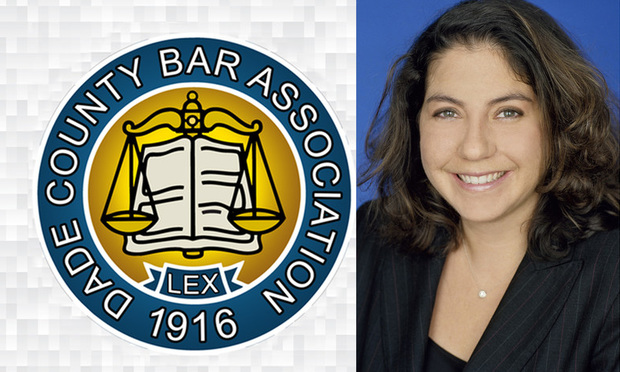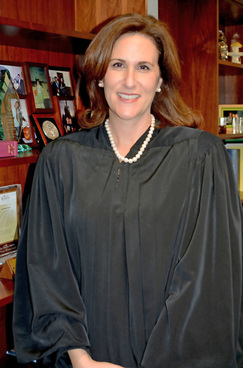Dade County Bar Association Reviews Judges: the Good, the Bad and the Ugly From the Poll
Here's what 1,645 Miami-Dade attorneys had to say about the judiciary and candidates running in the August primary.
August 24, 2018 at 12:34 PM
6 minute read
 Stephanie Carman, Dade County Bar Association president. Courtesy photo
Stephanie Carman, Dade County Bar Association president. Courtesy photo
The Dade County Bar Association has released its biannual judicial poll, which rates Supreme Court justices and Third District Court of Appeal judges seeking retention, Miami-Dade circuit and county judicial candidates, as well as sitting judges seeking re-election.
“It's always helpful to get feedback,” said bar president Stephanie L. Carman of Hogan Lovells in Miami. “Most judges receive very high marks, and I think that shows the dedication that they're putting forth in their daily duties.”
The Dade County Bar Association is the largest lawyer network in Miami, according to its website. Of 16,693 potential voters, less than 10 percent — 1,645 people — threw in their two cents.
“We appreciate everyone that did take the time to vote. I know most attorneys are extremely busy and they're getting hundreds of emails a day, and I think it shows that people are interested and wanted to be heard on the matter,” Carman said.
Read the 2018 judicial poll results:
 Miguel “Mike” Mirabal. Courtesy photo
Miguel “Mike” Mirabal. Courtesy photoMiguel “Mike” Mirabal, who's running for Miami-Dade County Court judge in the Aug. 28 primary elections, was disappointed by the sample size.
More than 40 percent of voters felt he was unqualified for the bench, but only 270 people voted in total.
“I don't take it too seriously because I saw the sample size and it's so tiny. Out of almost 17,000 attorneys in Miami-Dade County, I think that's horrible that only a handful of vocal people responded. You have to take it with a grain of salt,” Mirabal said.
Mirabal wants to see more voter engagement in polls like this.
“I understand people are on vacation, but attorneys should take more of an interest in who will be their judges,” he said.
But what's important to note, according to bar president Carman, are the instances in which attorneys chose not to vote.
“In a number of the positions there was no opinion expressed, and I think that is beneficial. It shows folks were cognizant of commenting only where they knew the individual, had experience with them, and no one was trying to just answer if they didn't honestly know,” Carman said.
 Justice C. Alan Lawson. Courtesy photo
Justice C. Alan Lawson. Courtesy photoOnly 35 percent of respondents voted on whether Supreme Court Justice Alan Lawson, appointed in December 2016, should be retained in office. But of the 575 attorneys who voted, almost 75 percent gave him a thumbs-up.
Of the Third District Court of Appeals judges, Kevin Emas obtained the highest percentage of “yes” votes, with more than 92 percent. He also received the highest number of votes in his group, clocking in at 1,083.
Appellate judge Norma Shepard Lindsey received the lowest number of votes in her group, as well as the lowest percentage of “yes” votes, with 81 percent.
Miami-Dade Circuit Judge Lisa Walsh received the highest number of votes in her group, as well as the top score.
Walsh clocked 976 votes, with 62 percent categorizing her as “exceptionally qualified” and almost 32 percent labeling her “qualified.”
 Miami-Dade Circuit Judge Lisa Walsh. Courtesy photo
Miami-Dade Circuit Judge Lisa Walsh. Courtesy photo“I'm very honored and gratified and hope that I can continue to earn the respect of the bar,” said Walsh, who was appointed to the bench by Gov. Rick Scott in 2011 and elected in 2012.
But Walsh says being the highest scorer is no reason to stop striving for improvement.
“I can always be a better manager. You can manage paper, cases, issues and writing. You can manage your speed and caseload. But I think I can always do a better job managing people,” she said. “For the litigants that come to court, that's the worst day for them. You really need to learn as a judge how to handle that effectively, make sure people are heard and make sure they understand that they're being heard.”
Walsh, who also won the outstanding jurist award at this year's annual Florida Bar convention in June, said the results of polls like this can be chalked up to a lot of things, including general popularity, controversial cases or election politics.
“I wouldn't take it too much to heart. But certainly, like I do, you always should be looking to see, 'What can I do better?'” she said. “Every one of us, no matter what, should take a very hard look at ourselves to think where's my area to improve, but I'm in no position to give advice or comment on any other judge. And as a matter of fact, I seek the advice of my fellow judges all the time.”
Miami-Dade Circuit Judge Miguel M de la O was another higher scorer, landing 600 “exceptionally qualified” votes and 358 “qualified” votes.
Sitting judge David C. Miller's results were a mixed bag, with 40 percent of respondents characterizing him as exceptionally qualified and more than 20 percent saying he was unqualified.
The lowest scorer in all groups was Miami-Dade County Court judicial candidate Elena Ortega-Tauler. Of the 288 people who voted, 69 percent categorized her as “unqualified.” Rosy Anette Aponte also received a low rating, with 172 out of 318 voters labeling her as ”unqualified.”
In response to unfavorable ratings Aponte received from the Cuban American Bar Association recently, she told the Daily Business Review, “All judicial candidates have passed the qualifications to be on the ballot, so by what measurement are the few people who took the poll deciding who is qualified or not? There were no variables as to why someone is qualified or not. So how accurate can it be?”
Related stories:
Who Are the Best Judges in Miami-Dade, According to the Cuban American Bar?
Rosy Aponte and Kristy Nunez Vying to Become Next Miami-Dade Judge
Judge David Miller and Challenger Elisabeth Espinosa Vie for Miami-Dade Bench
This content has been archived. It is available through our partners, LexisNexis® and Bloomberg Law.
To view this content, please continue to their sites.
Not a Lexis Subscriber?
Subscribe Now
Not a Bloomberg Law Subscriber?
Subscribe Now
NOT FOR REPRINT
© 2025 ALM Global, LLC, All Rights Reserved. Request academic re-use from www.copyright.com. All other uses, submit a request to [email protected]. For more information visit Asset & Logo Licensing.
You Might Like
View All


U.S. Eleventh Circuit Remands Helms-Burton Trafficking Case Involving Confiscated Cuban Port
3 minute read
Miami Lawyer Guilty of Indirect Criminal Contempt But Dodges Paying Legal Fees
4 minute readTrending Stories
- 1Supreme Court Takes Up Challenge to ACA Task Force
- 2'Tragedy of Unspeakable Proportions:' Could Edison, DWP, Face Lawsuits Over LA Wildfires?
- 3Meta Pulls Plug on DEI Programs
- 4On the Move and After Hours: Meyner and Landis; Cooper Levenson; Ogletree Deakins; Saiber
- 5State Budget Proposal Includes More Money for Courts—for Now
Who Got The Work
Michael G. Bongiorno, Andrew Scott Dulberg and Elizabeth E. Driscoll from Wilmer Cutler Pickering Hale and Dorr have stepped in to represent Symbotic Inc., an A.I.-enabled technology platform that focuses on increasing supply chain efficiency, and other defendants in a pending shareholder derivative lawsuit. The case, filed Oct. 2 in Massachusetts District Court by the Brown Law Firm on behalf of Stephen Austen, accuses certain officers and directors of misleading investors in regard to Symbotic's potential for margin growth by failing to disclose that the company was not equipped to timely deploy its systems or manage expenses through project delays. The case, assigned to U.S. District Judge Nathaniel M. Gorton, is 1:24-cv-12522, Austen v. Cohen et al.
Who Got The Work
Edmund Polubinski and Marie Killmond of Davis Polk & Wardwell have entered appearances for data platform software development company MongoDB and other defendants in a pending shareholder derivative lawsuit. The action, filed Oct. 7 in New York Southern District Court by the Brown Law Firm, accuses the company's directors and/or officers of falsely expressing confidence in the company’s restructuring of its sales incentive plan and downplaying the severity of decreases in its upfront commitments. The case is 1:24-cv-07594, Roy v. Ittycheria et al.
Who Got The Work
Amy O. Bruchs and Kurt F. Ellison of Michael Best & Friedrich have entered appearances for Epic Systems Corp. in a pending employment discrimination lawsuit. The suit was filed Sept. 7 in Wisconsin Western District Court by Levine Eisberner LLC and Siri & Glimstad on behalf of a project manager who claims that he was wrongfully terminated after applying for a religious exemption to the defendant's COVID-19 vaccine mandate. The case, assigned to U.S. Magistrate Judge Anita Marie Boor, is 3:24-cv-00630, Secker, Nathan v. Epic Systems Corporation.
Who Got The Work
David X. Sullivan, Thomas J. Finn and Gregory A. Hall from McCarter & English have entered appearances for Sunrun Installation Services in a pending civil rights lawsuit. The complaint was filed Sept. 4 in Connecticut District Court by attorney Robert M. Berke on behalf of former employee George Edward Steins, who was arrested and charged with employing an unregistered home improvement salesperson. The complaint alleges that had Sunrun informed the Connecticut Department of Consumer Protection that the plaintiff's employment had ended in 2017 and that he no longer held Sunrun's home improvement contractor license, he would not have been hit with charges, which were dismissed in May 2024. The case, assigned to U.S. District Judge Jeffrey A. Meyer, is 3:24-cv-01423, Steins v. Sunrun, Inc. et al.
Who Got The Work
Greenberg Traurig shareholder Joshua L. Raskin has entered an appearance for boohoo.com UK Ltd. in a pending patent infringement lawsuit. The suit, filed Sept. 3 in Texas Eastern District Court by Rozier Hardt McDonough on behalf of Alto Dynamics, asserts five patents related to an online shopping platform. The case, assigned to U.S. District Judge Rodney Gilstrap, is 2:24-cv-00719, Alto Dynamics, LLC v. boohoo.com UK Limited.
Featured Firms
Law Offices of Gary Martin Hays & Associates, P.C.
(470) 294-1674
Law Offices of Mark E. Salomone
(857) 444-6468
Smith & Hassler
(713) 739-1250






